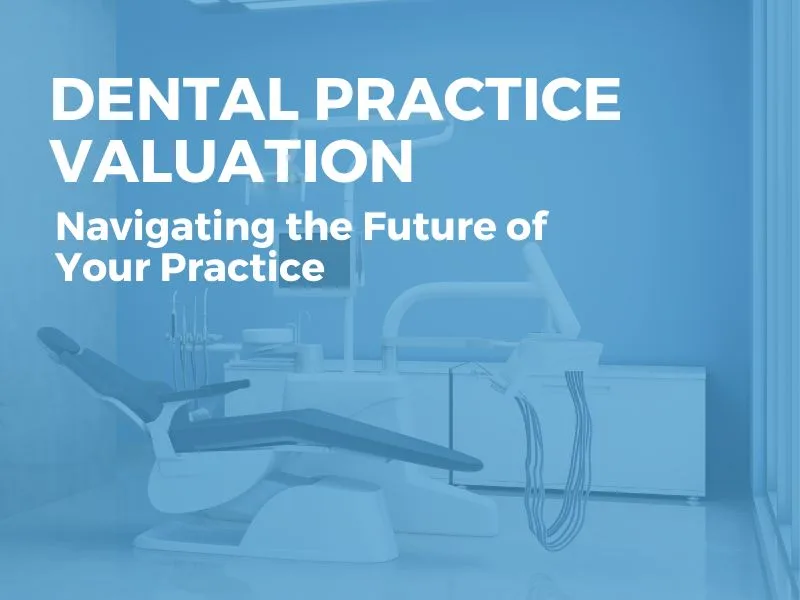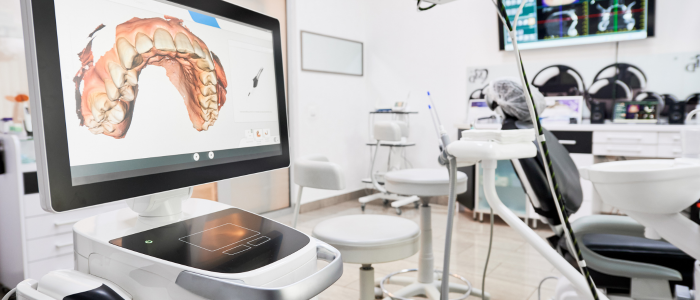Understanding the value and health of your dental practice is not just a necessity; it’s a strategic tool for success. A dental practice valuation, often perceived as a prelude to selling, go far beyond this purpose. These evaluations are comprehensive assessments that delve into the various facets of your practice, from financial performance to patient satisfaction and operational efficiency to technological advancement.
But why should a dental practice owner consider a valuation, especially if they have no immediate plans to sell? The reason is found in the numerous advantages that these valuations provide. They are not just about putting a price tag on your practice; they are about understanding its strengths, identifying areas for improvement, and strategically positioning your practice for future success, regardless of your plans to stay or sell. Let’s explore the complex aspects of dental practice evaluations and uncover why they are an indispensable tool for every dental practitioner, regardless of their specific business objectives.

What is a Dental Practice Valuation?
A dental practice evaluation is a thorough assessment of a dental clinic’s overall health and performance. It’s akin to a comprehensive check-up for your practice, diagnosing its strengths and areas needing improvement. This evaluation is not just about determining the monetary value of the practice; it’s a critical tool for strategic planning and informed decision-making.
Purpose of a Dental Practice Valuation
A dental practice evaluation aims to provide a clear, objective picture of where a practice stands in the current market. It involves analyzing various aspects of the practice to understand its operational efficiency, financial stability, and competitive positioning. The purpose of this evaluation is multifaceted: it helps identify growth opportunities, prepare for future transitions, and ensure the practice aligns with the latest industry standards and patient expectations.
Key Components of a Valuation
Financial Health
This includes a review of the practice’s revenue streams, profitability, expense management, and financial policies. It’s crucial to understand the financial stability and potential of the practice.
Patient Base
Evaluating the patient base’s size, demographics, and loyalty is essential. This involves assessing patient retention rates, new patient acquisition strategies, and overall patient satisfaction.
Technology and Equipment
Modern dental practices rely heavily on technology and equipment. This component assesses the current state of the practice’s equipment, software, and technology adoption and how it compares to industry standards.
Staff and Operations
An in-depth evaluation of the practice’s staff efficiency and expertise, along with a review of operational workflows, encompasses assessing staff roles, responsibilities, training, and the general operational effectiveness of the practice.
Market Position and Competitive Analysis
Comprehending the practice’s position relative to competitors and the broader market is essential. This requires an analysis of market trends and competitor strategies and identifying the practice’s unique selling points.

Why Do Buyers Pay a Premium for Dental Practices with Growing Revenues?
Buyers are often eager to invest more in dental practices that demonstrate a trend of increasing revenues. Here’s why:
- Signal of Success: Consistent revenue growth suggests that a dental practice is thriving. It implies efficiency in operations and a strong reputation in the community, attracting more patients and retaining them effectively.
- Future Value: When revenues are on the rise, it’s a clear indication that the practice holds potential for future expansion. Buyers recognize this and are willing to pay extra for a practice that promises continued financial growth.
- Reduced Risk: A practice showing a history of increasing earnings generally presents a lower risk to investors. The trajectory of growth suggests sustainability, making it less likely that the business will suffer financial downturns.
- Strong Market Position: Growing revenues often reflect a strong position in the market. This means the practice is capable of withstanding competitive pressures, which is a highly valuable trait for any investor.
- Strategic Investments: Buyers are more comfortable investing in businesses that can adapt and innovate. Revenue growth often indicates that a practice is reinvesting earnings into areas like technology or expanding services, which are critical for staying ahead in the healthcare landscape.
In summary, the premium paid by buyers is a direct reflection of their confidence in the practice’s current success and future potential. It’s an investment into an evolving, resilient business poised for sustainable growth.
Why is Average Profit per Patient Crucial in Dental Practice Valuation?
In the dental industry, understanding the average profit per patient is pivotal for evaluating a practice’s value. This metric offers insights into several key aspects that buyers and stakeholders find indispensable.
Insight into Service Profitability
Firstly, the average profit per patient helps identify which services contribute most to the bottom line. Services with higher profit margins should be the focus, as they signify areas of potential growth. Maximizing returns from these services can enhance overall profitability.
Focus on High-Value Patients
Identifying patients who generate higher profits allows dental practices to prioritize their care and engagement strategies. High-value patients can be nurtured to maintain long-term relationships that support continual income streams. This stability is particularly appealing to potential buyers who value predictability in revenue.
Significance of New Patient Acquisition
The metric also highlights the importance of acquiring new patients, who often bring higher initial profit margins compared to existing patients. A steady influx of new patients can drive substantial revenue growth, which is a compelling factor in practice valuation.
Evaluating Patient Retention and Attrition
Understanding the average profit per patient sheds light on patient retention rates and attrition. Keeping a balanced patient portfolio ensures a practice remains resilient, providing consistent financial performance that prospective buyers desire.
Ultimately, the average profit per patient is a comprehensive indicator of a dental practice’s financial health. By focusing on this metric, practices can optimize operations and enhance their marketability to potential acquirers.
What is the Ideal Collection Rate for a Dental Practice?
When evaluating the financial health of a dental practice, one crucial metric is the collection rate. This percentage reflects how effectively a practice collects payments owed after taking into account any insurance adjustments or discounts offered.
Target Collection Rate
For a dental practice to maintain robust financial health, aiming for a collection rate around 98% is generally recommended. This means the practice successfully collects 98% of the payments due after adjustments, ensuring most of the revenue is captured effectively.
Why is it Important?
- Reflects Financial Health: A high collection rate indicates strong financial management and operational efficiency.
- Enhances Cash Flow: Reliable collections improve cash flow, enabling practices to reinvest in advanced technologies and better patient care.
- Builds Trust with Stakeholders: Consistently high collection rates can bolster confidence among partners and investors, showcasing the practice’s ability to manage finances competently.
Steps to Achieve a High Collection Rate
- Streamline Billing Processes: Automate and simplify billing procedures to minimize errors.
- Train Staff Effectively: Ensure staff are well-versed in collection practices and patient communication.
- Establish Clear Payment Policies: Develop transparent payment guidelines for patients and insurance claims.
By focusing on these elements, dental practices can strive toward achieving an ideal collection rate, ultimately fostering a financially sound and reputable operation.

Understanding the Impact of Staff Compensation and Turnover on Dental Practice Value
Compensation and turnover are two pivotal factors that significantly influence the value of a dental practice. Let’s break down how each element plays a role in shaping the financial and operational landscape.
Staff Compensation: The Investment in Talent
In the dental industry, allocating an appropriate percentage of revenue to staff salaries and wages is vital. Typically, the industry benchmark for this is around 20.6% on average. However, this percentage can fluctuate based on various economic conditions, such as a tighter budget seen in the 2020 period.
Paying competitive wages is not just an expense—it’s an investment in attracting and retaining skilled dental professionals. Well-compensated staff are likely to feel valued and motivated, leading to higher productivity rates and improved patient care. This, in turn, enhances the reputation of the practice, attracting more patients and potentially increasing revenue.
Employee Turnover: The Cost of Change
High employee turnover can be costly, both financially and in terms of productivity. When a practice frequently loses staff, it not only incurs costs related to recruitment and training for new hires but also risks losing accumulated knowledge.
Long-term employees, often referred to as tenured staff, are more than just experienced—they embody the practice’s culture and processes. Their deep understanding of internal policies—their ‘tribal knowledge’—allows them to work efficiently and identify areas for improvement. This continuity fosters stability and can create significant operational value for the practice.
Balancing Compensation and Turnover
Finding the right balance between compensating staff and keeping turnover low is crucial. Practices that maintain a stable workforce with competitive pay structures are often better positioned to provide consistent patient experiences and build strong community reputations.
In summary, how a dental practice manages compensation and turnover has profound effects not only on its current operations but also on its overall valuation. Prioritizing fair compensation and minimizing turnover can lead to greater efficiency, increased patient satisfaction, and ultimately, a more valuable practice.
How Do Fixed Expenses Versus Variable Expenses Affect a Dental Practice’s Value?
Understanding the difference between fixed and variable expenses is crucial for assessing a dental practice’s financial health and overall value.
Fixed Expenses and Their Impact
Fixed expenses are consistent costs that a dental practice incurs regardless of its performance level. These can include rent, utilities, salaries, and insurance. Because these expenses do not fluctuate with the volume of patients or revenue, they can represent a significant portion of a dental practice’s budget.
- Financial Stability: Practices with lower fixed expenses relative to their total expenses often enjoy greater financial stability. A lean fixed expense structure reduces risk, making the practice more appealing to potential buyers.
- Potential for Cash Flow: When fixed expenses are kept in check, there’s more opportunity for profit as revenue grows, since a larger portion of income can contribute to cash flow instead of covering overhead costs.
Variable Expenses and Their Flexibility
Variable expenses, meanwhile, change based on the level of production. These might include materials, supplies, and any expenses directly tied to patient care volume.
- Scalability: Practices that maintain a lower percentage of variable expenses relative to fixed expenses are in a better position to scale profitably. As patient numbers increase, these costs rise, but they also drop if patient numbers decrease, providing flexibility.
Balancing Act for Value
A dental practice that skillfully balances its fixed and variable expenses can enhance its attractiveness to investors. Ideally, fixed expenses should make up less than 60% of total costs, creating an appealing financial landscape that minimizes risk and maximizes profitability as business grows.
By optimizing this balance, a practice not only enhances its day-to-day financial performance but also its long-term value, making it an enticing prospect for acquisition or investment.
Understanding Capital Expenditure Adjustments in Dental Practice Valuation
When assessing the value of a dental practice for purchase, one crucial element that affects the pricing is capital expenditures. These are investments in assets expected to provide future benefits, such as acquiring new dental or IT equipment.
How Capital Expenditures Impact Valuation:
- Types of Capital Expenditures:
- Growth-Driven Investments: Expenses aimed at boosting the practice’s capability and efficiency, like new machinery or advanced technology.
- Ongoing Maintenance: Routine expenses necessary to maintain current operations, though typically not factored into adjustments.
- Effect on Cash Flow:
- Future capital expenditures are often deducted from the practice’s adjusted cash flow. This deduction provides a more accurate estimate of future cash flows, helping buyers gauge the potential return on investment.
- Influence on Purchase Price:
- The projected decrease in cash flow, due to anticipated capital expenses, generally results in a lower valuation. Buyers need to anticipate these costs when negotiating the purchase price to ensure they are reflective of all expected financial commitments.
In summary, understanding and adjusting for capital expenditures is vital for determining a fair purchase price for a dental practice. These future investments and their impact on cash flow can significantly influence the final valuation.

What Are the Two Most Widely Used Evaluation Methods for Dental Practices?
When evaluating the worth of dental practices, two primary valuation methods stand out. Firstly, the market approach compares the practice to similar ones recently sold in the market, assessing how much buyers are willing to pay in comparable scenarios. Secondly, the income approach involves financial calculations, such as capitalization of earnings or discounted cash flow, to gauge the practice’s potential for generating future income. Both methods provide a comprehensive view of the practice’s financial value.
How Do You Evaluate Your Practice Value?
Evaluating the value of a dental practice is a nuanced process that requires a blend of financial analysis, market understanding, and industry insight. Whether you’re considering selling your practice or want to understand its current standing, knowing how to evaluate its value is crucial.
Steps Involved in Evaluating a Dental Practice
● Financial Analysis: Begin with a thorough review of your financial documents, including profit and loss statements, balance sheets, and cash flow statements. A vital component of this financial analysis is understanding your practice’s EBITDA. Analyzing EBITDA offers a clearer view of the practice’s financial performance, excluding factors like loan payments or one-time expenses that might skew the overall picture.
● Operational Review: Assess the operational aspects of your practice. This involves examining patient flow, appointment scheduling efficiency, staff productivity, and overall operational processes.
● Market Analysis: Conduct a market analysis to gauge the demand for dental services in your area, the competitive landscape, and pricing strategies.
● Asset Valuation: Evaluate the current value of your physical assets, including dental equipment, technology, office space, and any real estate owned by the practice.
● Intangible Assets: Consider the value of intangible assets like your practice’s brand, reputation, patient relationships, and goodwill in the community.
Understanding the Market Approach to Valuing Dental Practices
The market approach determines the value of a dental practice by analyzing financial data from previous sales within the industry. Essentially, this method compares the practice in question with similar practices that have recently been sold.
Key Factors Considered:
- Historical Sale Prices: It examines the sale prices of other dental practices to find patterns or benchmarks.
- Annual Revenue: The practice’s yearly income is evaluated to gauge its market position.
- Annual Cash Flow: The approach also considers the cash flow, highlighting the practice’s financial health and operational efficiency.
This valuation method leverages actual market data, which can provide a realistic insight into what potential buyers might be willing to pay. By assessing these elements, the market approach offers a direct perspective on the practice’s current market value, aligning closely with industry standards and trends.
How Do Market Multiples Help Determine the Price of a Dental Practice?
When it comes to valuing a dental practice, market multiples offer a straightforward yet insightful method. Although they may lack precision in some cases, these metrics provide a valuable starting point for estimating value based on key financial indicators.
Understanding Market Multiples
Market multiples represent a way to estimate a practice’s value by comparing its adjusted cash flow to typical industry standards. For dental practices, this often means multiplying the normalized cash flow—after removing irregular or personal expenses—by a specific range of figures known as market multiples. Generally, these figures range from 2.5x to 4.5x for dental practices, depending on various attributes.
Factors Affecting Market Multiples
Several factors influence where a particular dental practice falls within the market multiples range:
- Profitability and Growth Opportunities: More profitable practices with potential for growth typically command higher multiples.
- Size of Practice: Larger practices generally attract higher multiples due to economies of scale and increased buyer interest.
- Qualitative Factors: Aspects like location, lease terms, staff stability, technology, and equipment age can also sway the multiples applied.
Practical Application of Market Multiples
To illustrate, consider a dental practice with $5 million in annual revenue and an adjusted cash flow of $1 million. Based on market multiples, this practice might be valued between $3.5 million and $4.0 million, assuming it exhibits strong qualitative attributes.
Dynamic Nature of Market Multiples
It is also essential to recognize that market multiples can fluctuate based on broader economic conditions, industry trends, and regulatory changes. Occasionally, unique merger scenarios may push valuations beyond typical ranges when buyer and seller synergies align perfectly.
Complementary Valuation Methods
While market multiples provide a convenient benchmark, they are often used alongside other valuation methods, such as the discounted cash flow (DCF) approach. A DCF analysis considers the present value of expected future cash flows, offering a more thorough valuation perspective.
In summary, market multiples serve as an efficient tool for estimating the price of a dental practice by converting adjusted cash flow figures into a market-aligned valuation, allowing for meaningful comparisons across the industry.
How is the Future Cash Flow of a Dental Practice Estimated in the Market Multiple Approach?
When estimating the future cash flow of a dental practice using the market multiple approach, the process involves comparing the practice to similar businesses in the industry. Here’s a step-by-step breakdown:
- Identify Comparable Practices: Start by selecting dental practices that are similar in terms of size, services offered, and geographic location. This helps ensure a more accurate valuation.
- Analyze Financial Metrics: Examine the financial performance of these comparable practices, focusing on key metrics such as revenue, EBITDA (Earnings Before Interest, Taxes, Depreciation, and Amortization), and net income.
- Determine Market Multiples: Calculate the market multiples from these comparable practices. A common multiple is the EBITDA multiple, which is derived by dividing the enterprise value of a comparable practice by its EBITDA.
- Apply the Multiple to the Practice: Apply the determined market multiple to the financial metrics of the dental practice in question. For example, multiplying the practice’s EBITDA by the industry average EBITDA multiple provides an estimated enterprise value.
- Adjust for Unique Factors: Adjust this value for any unique factors that might affect the practice’s cash flow, such as trends in patient volume, market position, or changes in the local economy.
By leveraging this comparative analysis, stakeholders can estimate a fair market value based on projected cash flows, providing a clear picture of the practice’s financial prospects.
What Factors Influence the Range of Market Multiples for Dental Practices of Different Revenue Sizes?
Understanding the market multiples for dental practices involves examining various influencing factors. These multiples often fluctuate based on the size of the practice’s revenue and other qualitative aspects.
Revenue-Based Multiples
- $1 million to $3 million: Typically have cash flow multiples ranging from 2.5x to 3.0x.
- $3 million to $5 million: Often see a slight increase, with multiples between 3.0x to 3.5x.
- $5 million to $10 million: The range further grows to 3.5x to 4.0x.
- $10 million to $20 million: Larger practices can expect multiples around 4.0x to 4.5x.
Key Influencing Factors
- Revenue Size: As demonstrated, larger practices tend to have higher multiples due to increased stability and scalability, which attract buyers.
- Qualitative Qualities: These might include the reputation of the practice, quality of patient care, and the strength of the management team. Practices exhibiting strong qualitative attributes can command higher valuations.
- Market Conditions: The overall economic environment, changes in regulatory policies, and industry trends can significantly impact these valuations. Periods of economic growth might lead to higher valuations, while recessions could cause a decrease.
- Buyer/Seller Synergies: In some cases, unique synergies between the buyer and seller can drive prices above standard multiples. These synergies might involve complementary business models or strategic geographic expansion.
- Adjustments and Margins: Specific financial adjustments can also influence the perceived cash flow, affecting the final multiple applied.
In summary, a dental practice’s market value is determined not just by its revenue size but also by its qualitative strengths and the broader economic environment. Keeping abreast of these factors is crucial for understanding potential shifts in valuations.

Understanding the Capitalized Earnings Method in the Income Approach
The capitalized earnings method is a popular technique used to assess the value of a business, especially within the income approach framework. This approach focuses on estimating the business’s future cash flow to determine its current market value. Here’s how it works:
- Projected Cash Flow: Begin by estimating the expected cash flow for the forthcoming year. Alternatively, you might consider using an average of the cash flows from the past few years to get a more balanced view.
- Capitalization Rate: Next, this anticipated cash flow is divided by a capitalization rate. This rate, typically ranging from 20% to 30% for many industries, helps convert the expected future earnings into present value. The capitalization rate essentially reflects the risk and return profile of the investment.
- Market Value Calculation: By dividing the estimated cash flow by the capitalization rate, you determine the market value of the business. This formula can be particularly effective for understanding the worth of dental practices, among other types of businesses.
- Size Consideration: It’s important to note that larger practices or businesses might have lower capitalization rates due to their potentially lower risk and higher stability.
By interpreting projected earnings in this manner, investors and business owners can gain a clearer understanding of the business’s financial potential and current market value.
Understanding the Discounted Cash Flows Method in Dental Practice Valuation
The discounted cash flows (DCF) method is a popular approach for valuing dental practices due to its comprehensive consideration of future income. Here’s a breakdown of how it works:
- Estimation of Future Cash Flows:
- The process begins by projecting the dental practice’s cash flows for the next five years. These projections are typically based on anticipated growth rates within the dental industry or broader economic trends.
- Net Present Value Calculation:
- Once the cash flows are projected, each of these future income streams is converted into present value terms. This involves applying a discount rate, which reflects the risk and time value of money. Typically, discount rates range from 18% to 29%, although they may be lower for larger practices due to perceived stability.
- Perpetual Value Inclusion:
- After calculating the present value of cash flows for the defined period, the next step is to ascertain the perpetual value. This is the net present value of the income expected to continue indefinitely beyond the initial forecast period.
By synthesizing these elements, the DCF method provides a comprehensive estimate of a dental practice’s current market value. The choice of discount rate and accuracy of projected cash flows are crucial, as they significantly influence the final valuation.
The Importance of a Third-Party Evaluator
While some aspects of the evaluation can be done internally, the complexity of valuing a dental practice often necessitates the expertise of a third-party. This offers an unbiased viewpoint and refreshing perspective on the strengths and weaknesses of your practice. (Request your free Dental Practice Valuation here)

Elements that Affect the Valuation of a Dental Practice
Several factors can influence the value of a dental practice, including:
● Location: Practices in high-demand areas may have higher values.
● Patient Base: A loyal and growing patient base can significantly increase value.
● Revenue and Profitability: Consistent revenue growth and profitability are critical indicators of a healthy practice.
● Technology and Equipment: Modern, well-maintained equipment and the use of advanced technology can enhance value.
● Staff and Management: A skilled, stable team and efficient management practices are attractive to potential buyers.
● Market Trends: Current trends in the dental industry can impact practice value.
Understanding these factors and how they apply to your practice is essential in obtaining an accurate evaluation. Whether you’re planning for the future or considering a sale, a comprehensive assessment of your practice’s value is a critical step in making informed decisions for your business’s growth and success.
Why Get a Practice Evaluation? Benefits of a Practice Evaluation
Understanding your dental practice’s value and operational health is not just about preparing for a sale; it’s a strategic move that can yield numerous benefits for your practice. Regular evaluations offer key insights essential for the enduring success and viability of your business.
Industry Trends to Consider
Smart buyers weigh risks versus rewards when considering the purchase of a company. Here are key trends in the dental industry that impact risk and opportunity:
- Increased Demand for Prosthodontic Services: Industry operators have seen a rise in demand for both fixed and removable prosthodontic services.
- Decreased Patient Costs: Over the past five years leading to 2021, the effective cost to dental patients has decreased, making services more accessible.
- Challenges for New Dentists: High costs of starting a new practice and rising education expenses have deterred many dentists from opening their own practices.
- Aging Population: This demographic continues to drive demand, as older adults require more dental care.
- Revenue Sources: Private beneficiary reimbursements represent a significant share of industry revenue, influencing financial stability.
- Graduate Debt: New dental school graduates often face substantial school debt, impacting their willingness to establish solo practices.
- Expanded Dental Coverage: Increased dental coverage has significantly contributed to industry revenue growth.
Preparing for Unforeseen Circumstances
The healthcare industry, including dentistry, is subject to rapid changes due to technology advancements, market dynamics, and even global health situations. Regular practice evaluations prepare you for these unforeseen circumstances by ensuring your practice is operationally and financially robust. This preparation can be crucial in navigating challenges such as economic downturns, health crises, or shifts in patient needs.
Benchmarking Against Industry Standards
An evaluation also serves as a benchmarking tool. It allows you to compare your practice against industry standards and best practices. This is invaluable for staying competitive and ensuring that your practice is keeping up and leading in patient care quality, technological advancements, and operational excellence.
By incorporating these trends into your practice evaluation, you not only prepare for the future but also position your business to leverage industry dynamics effectively.

What if I’m Not Looking to Sell My Practice Right Away?
Many dental practitioners might wonder about the relevance of a practice evaluation if they have no immediate plans to sell. However, understanding the value and operational health of your practice is crucial for several reasons, even if selling is not on your current agenda.
Long-term Strategic Planning and Practice Development
A practice evaluation provides critical insights that are essential for long-term strategic planning. By understanding the strengths and weaknesses of your practice, you can develop a roadmap for future growth and development. This might involve expanding services, investing in new technologies, or enhancing patient care strategies. A clear understanding of your practice’s current position allows you to set realistic goals and make decisions that align with your long-term vision.
Understanding the Current Market Value for Future Reference
Even if you’re not planning to sell soon, knowing the current market value of your practice is beneficial. Market conditions and practice values can fluctuate, so having a baseline understanding of your practice’s worth can be invaluable for future planning. This knowledge can aid in decision-making regarding investments, expansions, or even retirement planning.
Using the Evaluation as a Tool for Personal and Professional Growth
An evaluation is not just about the practice but also reflects your management and leadership skills. Understanding the areas where your practice excels or needs improvement can be a catalyst for personal and professional growth. It encourages continuous learning and adaptation, qualities that are essential for any successful practitioner. A valuation can also serve as a benchmark to measure your efforts and progress.
The Importance of Being Prepared for Unexpected Opportunities
Like any other, the dental industry can present unexpected opportunities – from partnership offers to buyout proposals. A recent evaluation means you’re prepared to engage in these discussions knowledgeably and confidently. It ensures that you have a clear understanding of your practice’s worth, allowing you to make decisions that are in the best interest of both your personal and professional aspirations.
Conclusion
Dental practice valuations are not just a metric for those looking to sell; they are a critical tool for any dental practice owner seeking to understand and improve their business. We’ve seen how valuations can enhance practice management and efficiency, identify areas for growth, prepare for unforeseen circumstances, and benchmark against industry standards. They provide invaluable insights for long-term strategic planning and practice development, regardless of whether a sale is on the horizon.
Moreover, understanding your practice’s current market value is beneficial for future reference and empowers you to make informed decisions about investments and expansions. It’s also a tool for personal and professional growth, helping you to adapt and thrive in an ever-evolving industry. The importance of being prepared for unexpected opportunities cannot be overstated. In a dynamic market, being equipped with a current evaluation of your practice ensures that you are ready to make the most of any situation that arises. Dental practice valuations are an essential component of a successful business strategy. They offer a clear picture of where your practice stands today and provide a roadmap for where it could go tomorrow.
For dental practice owners, integrating regular evaluations into your business strategy is more than a smart choice; it’s an investment in the future success of your practice. Whether you’re planning to sell or simply aiming to excel in your field, understanding the value and health of your practice with the guidance of SPP Dental Partners is a step you must pay attention to.
For your complimentary practice valuation, click here.
